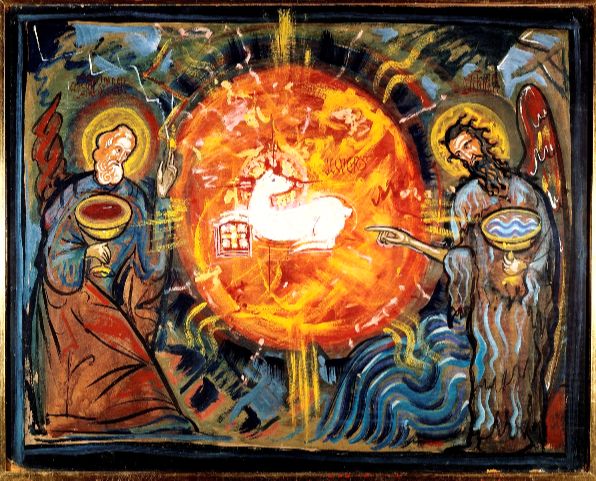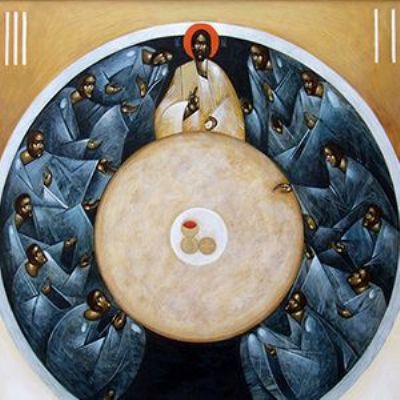The Holy Eucharist

Nourished by the Bread of heaven, and given life by the eternal Chalice, let us unceasingly render thanks to Christ, forever present in his Church. He has come to us in his sacraments and will return in glory to judge the world; He Who is co-eternal with the Father and the Spirit of life.
– from the Divine Liturgy according to Saint Germanus
What is this Bread of heaven? What is this eternal Chalice?
They are none other than the Body and Blood of Jesus Christ.
At the heart of the Christian life is the Holy Eucharist, in which Christians gather to take part in the celebration of the great Mystery of the saving work of Christ, and be fed with his Body and Blood.
The death of Jesus Christ on the Cross was not just an execution but it was also a sacrifice. Centuries earlier, when the people of Israel – the Old Testament Church – were freed from captivity and slavery in Egypt at the Exodus, the Passover lambs – the firstborn lambs – were sacrificed, the people of God were saved from death by their blood, which was smeared on the wood of the doorposts (Exodus 12: 1-14), and the faithful people ate the sacrificial lamb. So Jesus Christ is the new Passover Lamb, Who is sacrificed and whose blood, shed on the wood of the Cross, brings freedom and salvation from death to the New Israel – to all who are united to Him in the life of the Church, and whose union is sealed by consuming the Sacrifice.
At every celebration of the Divine Liturgy, this Sacrifice is once again made present. We enter into the state where time has no meaning, and where, by fulfilling the command of the Saviour to “do this”, we take part in that same, eternal Sacrifice, in which Christ is both the Priest (the one who offers the sacrifice) and the Victim (the living one that is offered in sacrifice). The priest calls upon the Father, asking Him to send down the Holy Spirit, Who sanctifies and consecrates the people’s offerings of bread and wine, transmuting them into the real and true Body and Blood of Jesus Christ.

However, it is not just the sacrificial death of the Saviour that is made present, but rather the entire saving work of God for humankind in creation: his suffering, death, burial, Resurrection, and Ascension to heaven. The Saviour gave us this command when He said, ‘Do this in memory of Me’. Memory in English is a poor translation of the original Greek anamnesis, which refers to a making present of things outside of the present, a bringing of the eternal into the here and now.
Thus, what we receive is not the dead, lifeless corpse of a man from two thousand years ago, but rather the sacrificed, risen, ascended, and glorified Body and Blood of the God-man, Jesus Christ, which are alive and which give life to all who receive Them within their own bodies as part of their ongoing growth into the life of God through the sacramental life of the Church.
‘Very truly, I tell you, unless you eat the flesh of the Son of Man and drink his blood, you have no life in you. Those who eat my flesh and drink my blood have eternal life, and I will raise them up on the last day; for my flesh is true food and my blood is true drink. Those who eat my flesh and drink my blood abide in me, and I in them. Just as the living Father sent me, and I live because of the Father, so whoever eats me will live because of me. This is the bread that came down from heaven, not like that which your ancestors ate, and they died. But the one who eats this bread will live for ever.’
– Jesus Christ (John 6)
Orthodox Christians come together with hungry bodies and souls, to celebrate the Great Mystery of our salvation, and to be fed by God with his Body and Blood, so that we might grow ever further and ever deeper into union with Him, as we take part in the eternal Wedding-Feast of the Lamb in the Kingdom of God.
Come, holy people,
take the Body of your Lord;
drink of his chalice,
take the Blood for you outpoured.
Saved by his Body
hallowed by his Blood, we raise
with grateful voices
to our God our hymns of praise.
In this great Myst’ry
of his Body and his Blood,
from fiery torments
we are rescued by our God.
He, our Salvation,
He, the Christ, the Son of God,
gained our redemption
by his Cross and precious Blood.
Slain for all people,
He the Lord prepared this Feast;
the holy Victim
offered by Himself as Priest.
Victims were offered
by the ancient law of old;
this sacred Myst’ry
types and shadows thus foretold.
He, the Light-Giver,
Saviour of the human race,
grants to his holy
servants his abundant grace.
All who with pure hearts
in the Saviour’s word believe,
come and, partaking,
saving grace from Him receive.
His holy people
know Him as their Guardian Lord;
now to the faithful
life eternal He affords.
The Bread of heaven
makes his hungry people whole;
this living Fountain
vivifies the thirsting soul.
He, the Anointed,
Alpha and Omega – He
will come in glory
as our Judge eternally.
– “Sancti, Venite, Corpus Christi Sumite”, St Seachnall of Dunslaughlin, 5th cent.
Translation by Adrian Fortecue and Cyprian Astley
Some points to bear in mind:
- Bearing in mind St Paul’s warning against eating and drinking the Eucharist unworthily (1st Corinthians 11: 27-29), we must always be mindful of our sinful state when we consider coming to Communion, and whether or not we plan to receive, we should approach a priest to confess our sins and receive absolution on a regular basis. At St Melangell’s, we try to follow a pattern of Confession at least monthly. However, those who wish to confess sins particularly weighing heavily on them prior to Communion may do so if they wish.
- On a day when we intend to receive Communion, it is customary to observe fasting from the moment we rise until we receive the Body and Blood of the Saviour, even on a day that otherwise is not observed as a day of fasting. As always, water does not break the fast. In circumstances where the Divine Liturgy can only be celebrated in the evening, fasting can begin from lunchtime, and any foods consumed prior to that point should at least follow the rule of abstinence. Details of our custom of abstinence may be found here.
- The Holy Eucharist is the action of the people of God and lies at the heart of the life of the Church, as an expression of the Church’s unity of faith and life in Jesus Christ. As such, it can only be partaken of by those who are fully united to Christ’s Body – that is to say, those who have been baptised and chrismated, and are at one with the faith and sacramental life of the Orthodox Church.
There is nothing exclusive about this: we warmly invite one and all to explore the Orthodox Faith and be received into full communion with us so that they can express that union with us through sacramental Communion, and we pray that this invitation will be accepted by as many people as possible. However, it is a sad consequence of history that divisions exist today among those who seek to follow Christ, and we recognise that some people’s beliefs or other attachments will prevent them from making this step into the Church at the moment. While we respect their decisions, we cannot use the precious and Holy Gifts of the Body and Blood of the Saviour to express a unity which does not actually exist. Those who do wish to be united to the Orthodox Church and receive the Holy Eucharist are invited to explore these pages.
‘Thus He washes us daily from our sins in his Blood, when the commemoration of his blessed Passion is renewed at the altar, when the creature of bread and wine is changed into the Sacrament of his Flesh and Blood by the ineffable operation of the Spirit.’
– St Bede the Venerable, 8th cent.
‘For we do not receive these things as common bread nor common drink; but in like manner as Jesus Christ our Saviour, having been incarnate by God’s Logos took both flesh and blood for our salvation, so also we have been taught that the food “eucharistised” through the word of prayer that is from Him, from which our blood and flesh are nourished by transformation, is the Flesh and Blood of that Jesus Who became incarnate.’
– St Justin Martyr, 2nd cent.
‘The Lord Jesus himself proclaims, “This is my Body.” Before the blessing of the heavenly words something of another character is spoken of; after consecration it is designated “Body”. He Himself speaks of his Blood. Before the consecration it is spoken of as something else; after the consecration it is spoken of as “Blood”. And you say, “Amen”, that is, “It is true”. What the mouth speaks, let the mind within confess; what the tongue utters, let the heart feel.’
– St Ambrose of Milan, 4th cent.
‘The bread and the wine of the Eucharist before the holy invocation of the adorable Trinity were simple bread and wine, but the invocation having been made, the bread becomes the Body of Christ and the wine the Blood of Christ.’
– St Cyril of Jerusalem, 5th cent.
‘For when the Lord says, “Unless you have eaten the flesh of the Son of Man, and drunk His blood, you will not have life in you”, you ought so to be partakers at the Holy Table, as to have no doubt whatever concerning the reality of Christ’s Body and Blood.’
– Pope St Leo the Great, 5th cent.
‘For as the bread, which is produced from the earth, when it receives the invocation of God, is no longer common bread, but the Eucharist, consisting of two realities, earthly and heavenly; so also our bodies, when they receive the Eucharist, are no longer corruptible, having the hope of the resurrection to eternity.’
– St Irenaeus of Lyons, 2nd cent.


